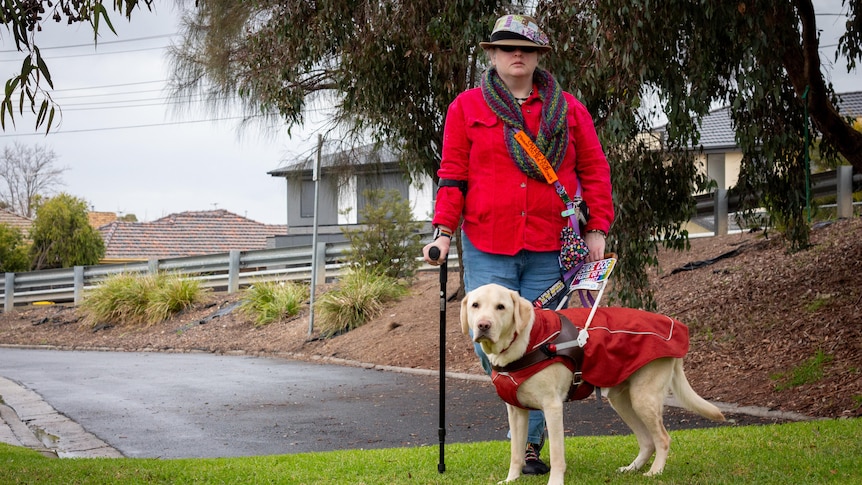Victorian woman Kathryn Beaton says repeated, illegal denials of service from drivers refusing to allow her guide dog into their vehicles have left her effectively housebound.
Edited to add: “anxious and in tears” is some shit tier headline writing when the real problem is the loss of independence and freedom, and the hours she has had to spend waiting just to be actively discriminated against.
So as a taxi driver with asthma and horrific allergies, I’ve found dog owners are not typically terribly understanding when I tell them we’re going to have another cab come pick them up. I’ve had several people insist that their animal is a service dog as if this somehow changes my own health condition.
I’ve often found that my own access to public spaces is limited by the use of service animals and straight up pets in public places. I don’t even try to go to breweries anymore. I wouldn’t bother trying to get on a plane. Even hotels are basically a no go for me unless i want to get sick more often than not.
I don’t pretend to have a solution to this, but access to public spaces for animals and for some allergy sufferers is mutually exclusive. It makes it a lot more complicated than ‘service animals should be everywhere’ or ‘allergy sufferers should have access to public spaces’. The two are kind of in conflict. It sucks.
Nobody pays any mind to air quality and it’s made my life a whole lot more difficult than it needs to be.
Anyway, i feel for her, but i think the service animal stuff is way over simplified and people forget that other people with disabilities also pay a cost.
The fact that this blind lady needs to have both her guide dog and a taxi/rideshare to get around anywhere sucks for both her and the driver - the former for obvious reasons, and the latter for the reasons you listed out. It’s a sort-of perfect microcosm of the major issue a lot of modern cities seem to have: poor public transit and heavy car-centric infrastructure.
The unfortunate reality that she absolutely needs a car to seemingly get anywhere is the problem here. People - and not just people with disabilities, but in general - should have (and deserve) different viable options to get around. The whole idea of a person becoming stuck at their house because of not being able to get the transport they need to get around the place is fuckin atrocious and should be what’s actually talked about here, not “jUsT lEt ThE aNiMaL oN!” or “MaKe An UbEr ApP fOr PeOpLe LiKe ThIs!”
You hit a nerve. I’m not blind, but my crazy glaucoma prevents me from safely operating a vehicle, so I voluntarily gave up driving years ago.
I live outside a village with no buses, taxis, trains, or ride shares, so when I go to my quarterly opthamologist visit, I have to arrange for someone to take me on the 4 hours round trip drive. (There’s no closer office.) I had to cancel tomorrow’s appointment when my arrangement fell through. I’m housebound and it’s fucking madness.
Just to add to the controversy, in a perfect world with good public transportation, how do you still accommodate both? On a train you could have an animal-free car but what about buses? You can’t have a separate bus for every single accommodation.
Where I live busses are often marked in the timetable as to whether they are wheelchair accessible. So there’s precedent already for mixed accomodation transport and informing customers in advance, it might be possible to extend that system further.
These days in most regions that would be illegal and the only leniency is for existing infrastructure where upgrades are challenging - but even then you need a transition plan in place… even if it is one that will take decades. Eventually, every bus needs to be accessible.
It’s just not good enough for people who cannot drive to also have limited access to public transport.
For the person who can’t share a vehicle with an assistance dog… really the only possible answer is public transport isn’t really accessible to them. That’s unfortunate but I don’t really see a solution other than travelling by car.
Discrimination legislation doesn’t require services be available for ever person, they just require taking reasonable steps to be available to as many people as practically possible.
I have severe allergies and on public transport I wear N95 mask. It effectively filters out everything that might be a problem for me, and as a bonus have avoided getting sick even when everyone around me seems to be catching things. If everyone did this we could eliminate airborne viruses and many other conditions, but I’m not holding out hope for that.
The increased air resistance of a mask is often a deal breaker for people with breathing issues.
During covid-19 the best advice for those people is you just need to deal with it, but only because your breathing issues make covid-19 especially high risk for those people. But it was very uncomfortable.
Well, if we properly defined ‘dog allergy’ as a disability, maybe the accessibility tool that we could use to accommodate it might be like… a gas mask or something like that?
It’d be strange at first, but eventually we’d treat them no differently than a cane or wheelchair.
I like your problem-solving mind, but I have some bad news about how people who use canes and wheelchairs are also treated.
So the thing to understand is that while well designed cities have good public transit, what they actually have better is walkability. You should be able to do most of your business without taking any transit options. This saves the disabled woman from needing to use transit and helps reduce the amount of service animals in transit.
There still needs to be some degree of mixing but there’s limitations as to how protected we can make things for everyone. Some people have an airborne allergy to peanuts but we aren’t going to ban peanuts everywhere to accommodate. People with severe animal allergies will have up continue finding ways to cope since we aren’t going to ban people from having pets. The best we can do is what’s reasonable.
in a perfect world with good public transportation, how do you still accommodate both
A) You have excellent public transport suitable for service animals, wheelchairs, blind people, etc
B) People who can’t take it for whatever reason travel by car. If you can get one (you won’t get one for asthma…) a disability parking permit is a huge help. They’re recognised globally and make it a lot easier to park in metropolitan areas. Those permits are valid whether you’re driving or a passenger. With one of those permits even car-hostile places like the Netherlands become practical.
Sure, but that doesn’t mean that every single taxi needs to be the taxi that picks up dogs.
I feel like the general approach taken by society when it comes to air quality, from strangers to my own family, is that air quality doesn’t really matter, and that no accommodations should ever be made to improve it.
Which is part of the reason I don’t really leave the house unless I have to. We’re both stuck at home, but the situations look a lot different, and in my case people almost never see the result.
Your disability is legitimate too, and should definitely be considered in any solution. I’m sorry to hear that your mobility is also affected by medical circumstances people don’t understand, I know it sucks hard.
I believe the app should state that the customer has a guide dog. That way people with allergies or phobias don’t have to accept the trip. I like dogs but my wife is deathly afraid of them. I blame her mother for instilling that fear but that’s a story for another time.
I believe that drivers who are unable to accept dogs due yo their own disabilities should be able to flag that with Uber to begin with, so they aren’t selected for the jobs. I also believe Uber needs to be penalised for illegally refused service, not just individual drivers.
I also believe Uber needs to be penalised for illegally refused service, not just individual drivers.
Uber’s legal team would point out that the “individual drivers” are subcontractors (not employees) and as a consequence Uber cannot really control which rides they accept. Allowing freedom to accept or refuse a job is one of the key differentiators between a contractor and an employee and Uber is very clear where they stand on that.
They have to be clear where they stand - otherwise they’d forced to pay minimum wage (In Australia that’s $73,125 per year) to drivers even if the drivers don’t pick up many passengers.
(Note: there are some regions where Uber drivers are employees - it’s a little different there)
Having said that - Uber’s contract with drivers prohibits discrimination. Any driver who discriminates is in breach of contract and if there is a plausible complaint, Uber will blacklist the driver. Plausible means you don’t even need proof. Contractors are not entitled to an official warning, they don’t get severance pay, they can’t argue “unfair dismissal”. It’s very easy for Uber to get rid of drivers in Australia.
As for actual penalties, it varies by state - but the driver could go to jail for it. I bet with a good lawyer, you could settle out of court - the driver would probably rather pay you (and your lawyer) than go to jail. The lawyer might even represent you pro bono if you have enough evidence.
My suggestion is to start discreetly taking a video when the driver picks you up. The video might not be admissible in court (ask a lawyer) but it will give you the ability to remember exactly what happened instead of relying on failable human memory. Having reliable and detailed evidence makes a huge difference in court (and in getting out of court settlements, which is what you really want). Also being legally blind hurts your credibility when relying on your eyesight as a witness. I’m not saying you’re unreliable, I’m just saying the lawyer defending a discrimination case will say that - and it might work.
Start fining uber the company a substantial amount for each offense and see how quickly their tone changes.
There’s still the problem of taxis who are frequently harder to identify, but I am 100% for enforced financial penalties for this.
OP is in Australia. Never mind fines, this offence attracts a prison sentence and CEOs are sentenced to prison (rarely).
It’s rare because most CEOs aren’t stupid enough to risk breaking the law. The drivers are to blame. Trying to pin responsibility on someone else is a waste of time.
I have a disability but I do think rideshare drivers should be allowed to decide if they want dogs in their privately-owned cars or not.
I find it strange that the person in the article specifically mentions 23 refusals from Uber drivers, but what about taxis? Taxis should not discriminate, unless the driver has a particular condition like allergies to dogs. If I had an assistance dog, I would be seeking taxis, not rideshare, because I understand most people wouldn’t want dogs in their own vehicle.
Do note I mentioned assistance dogs, which require certification.
deleted by creator
That’s a good point, and really unfortunate. I found the rising popularity of rideshare to be beneficial, as it meant more availabilities for rides and better pricing. However to get to that point, the barriers to entry for drivers had to be lower; the main appeal of being a rideshare driver is that you get more freedom than driving a taxi.
My concern is that by enforcing rules on rideshare drivers that they find too unfair, they are simply going to decide it’s not worth it, and leave the industry altogether. Then she will still find it difficult to get a ride, seeing as there are none.
It really is a tricky situation and my simple uneducated answer is “more taxis”.
In my experience calling a taxi leaves you on the phone on hold for 45mins, or the driver cancels on the way if they find someone else first (requiring you to rebook), or they don’t frequently show up in the area you need one, or they straight up drive past you to deny you to your face. Or they illegally require destination before allowing you in.
It might just be that it’s easier to count denials in the account history of the Uber app.
That’s appalling that that sort of behaviour is still prevalent with taxis. I think rideshare services also share the same problem though? There have been many anecdotes onine by Australians quoting their awful experiences with rideshare drivers and even some mentioning they found taxis to be the better option nowadays.
Regradless, I firmly believe the taxi industry should be held up to a higher standard.
Taxis were terrible before ride sharing came along and ride sharing has made them better - the Taxis have made significant efforts to improve now that they don’t have a monopoly. But they haven’t improved enough - Taxis are definitely worse than Uber in my city.
I think rideshare services have a bad reputation because they made some mistakes when they were starting out, and even now when they start in a new city and every single driver has zero experience so there will still be mistakes… but in general, now that ridesharing is well established, they are the best available service (at least in my city anyway - which is in Australia).
Yes, there’s still the occasional awful experience. “The best available” doesn’t mean “good enough”.
I avoid taxis more than uber because I tend to get poorer treatment from taxis for some reason. Other people I know find it’s the other way around. The difference isn’t hugely significant, probably.
Taxis and rideshares, at least here, are both private businesses with drivers governed by the company’s rules. I’d like to see them both held to the same standard, and I would like the companies themselves to be not-so-gently encouraged to improve their systems to minimise these situations. They can now, they just choose not to prioritise it because there are no associated risks with doing so.
This kind of stuff isn’t limited to people who have service dogs. A friend of mine has been having a rough time lately because they’re a wheelchair user and they keep having taxis mess them around. Stuff like saying the wheelchair won’t fit in the boot, or parking somewhere inaccessible then getting pissy and saying “I wouldn’t have taken the job if I’d known it would be like this”, even though access needs were mentioned on the booking.
And if anyone’s wondering, yes, this is discriminatory, there’s pretty clear laws against this in my country, but trust me, as someone who spent 2+ years trying to get some justice from that process, it’s even more inaccessible than the taxis (in terms of time, effort and money involved)
Weird there aren’t medical exceptions to said law about providing those services…
In the USA this would be illegal. You can’t deny a person with a disability that is accommodated by a service dog unless the dog is not obeying the handler or pees/poops inside. Doesn’t matter if someone has allergies, a phobia, or is religious. There are fines but it takes a very long time to get anywhere.
It probably shouldn’t include allergies…depending on how bad those are sneezing while at the wheel would be very dangerous…
Obviously it should be confirmed by a doctor…but still that sounds dangerous.
Might also be considered a disability in this case.
It certainly would be if it prevents people from breathing or driving or other parts of their job. Disability is a very inclusive concept, even if many people understandably don’t enjoy being counted as being included.
Doesn’t matter if someone has allergies
That sounds like bullshit, how can that not be a factor? How would, for example, a fear of dogs not be a factor?
I can absolutely understand having medically recognized allergies be an acceptable reason to refuse the service.
A fear of dogs doesn’t cut it for me. A fear of black people doesn’t mean you get to refuse service to them. A person has a right to have their service dog with them.
Illegal here too. Law is an empty threat when it’s not enforced and the right people/companies aren’t sufficiently penalised.
Just like Steve Bannon was sentenced to 4 months jail in Novermber, but has served 0 days in custody.
Not true. Service animals can be denied if they pose an immediate threat to human health or safety. An allergy could certainly be a threat to health, and a driver having an allergic reaction is definitely a threat to safety.
Also, the federal law only applies to public accommodations, I don’t think “ride-shares” would count as that. An Uber driver doesn’t stop and pick up the first person they see, they have a private agreement with a specific person.
That’s a real terrible situation for her.
Doesn’t uber have a pet friendly option when booking
Drivers may choose to stop receiving Uber Pet trips requests at any time, but are still required by law to accept riders with assistance animals (e.g. guide dogs) – assistance animals are legally allowed to go everywhere their owner goes. - Uber AU Pets policy
Riders with service animals are not required to use Uber Pet. Per Uber’s US Service Animal Policy (see below), driver partners have a legal obligation to provide service to riders with service animals, regardless of ride type. Uber US Pets policy
Uber Pets also charges a premium, which would still be discrimination in these cases. This is likely why people with assistance animals are not required to select it.
Then Uber should eat the cost difference and give her the pet friendly option. This is in no way on the drivers for refusing to let a dog in their personal vehicle.
If it made my life less of a night mare I’d just dish out the extra couple of bucks
I just checked the app and yeah, Uber Pet is a clearly marked option on there.
Why would you deny disable people a ride? I think just by accepting them, they’ll give you a big tip just for accepting the ride. In any case it’s still feels good to help people out, and make money at the same time, potentially a good tip if you be nice. Guide dogs are well trained so it doesn’t even affect your car that much. It doesn’t make sense to deny the ride, even just from a money-driven perspective, since the most vulnerable people are often the most kind people.
A few reasons. Firstly disabled people aren’t going to frequently tip in Australia, spending money to get everywhere is very expensive already. That’s before all the other costs that come with being disabled. Plus anti-tip culture is still a big thing in Australia.
Secondly, a significant amount of drivers don’t want mess, some of them are just anti-dogs for cultural or religious reasons, some people have phobias or allergies… some people have just heard too many horror stories about self-declared “emotional support animals”.
It’s a huge problem, and this sort of thing happens a lot, in different ways for different disabilities.
I think there should be an option in rideshares to register a service animal. Drivers should not be able to see it when the ride gets offered, but only when they are about like 1 block from the rider, then it show up as: “The rider have disabilities that requires the use of a service animal. Please be reminded that denying a ride due to a rider’s disability or due to unwillingness to accommodate the service animal is illegal under [Insert Country Name] law. Thank you for your cooperation!”
I’ve personally witnessed 2 taxi drivers in a 10 minute time span who were hailed on the side of the street begin to pull over to collect a passenger, but stop as soon as they see the guide dog and drive off saying “sorry, no dogs”. If they can deny someone to their face, they will deny them 1 block away.
I’d like to see the companies allow people with evidence of disability affected by dogs to opt out in advance from being assigned pickup jobs for people with service animals.
If the driver deny to accomodate for enough times, the driver should get deactivated.
From the article:
If a driver is reported once for refusing a service animal, they are suspended from the Uber driver app until they undergo additional education to understand their legal obligations.
A second report will generally result in permanent loss of access to the Uber driver app.
Drivers who breach the legal requirement to transport assistance animals in Victoria may be fined more than $1,900, lose their accreditation or, in some cases, face legal charges.
“Uber has tried to put things in place, but we don’t believe there has been a reduction in the frequency of issues — in fact we think there has been an escalation,” Blind Citizens Australia chief executive Sally Aurisch said.
She is calling for more law enforcement and transparency regarding refusal complaints, as well as service animal training in the preferred language of a driver.“At the moment people stop complaining because they never find out what has happened, … there are penalties in place, although we don’t see them being enforced regularly.”
Still happening and getting worse despite existing driver penalties. The penalty needs to be escalated up the chain to include the company.
If you read the article, it’s due to service animals. People are refusing people with animals because they think that service animals will shit and piss in their car, likely.
That and I think this is cherry picking data. What’s the data for anyone with a pet? How can someone even tell if someone’s blind? I don’t think it’s about being blind, it’s about the pet, she just can’t see the person drive up, see a dog, and drive off.
Real service animals are well trained enough to not misbehave or damage property.
Unfortunately many people who don’t have trained service animals claim they do.
In the US at least you are allowed to ask what task the dog is trained to perform (but not what illness/disability the person has), and can have the dog removed if it is out of control or not housebroken, but service cannot be denied due to allergies.
Yeah, I know that. How Uber will enforce a change will be interesting (if they even did anything)
deleted by creator
same way stores can deny service to individuals.
That really depends on the reasons. Denying service for a discriminatory reason (like a disability) will generally breach discrimination laws.
It sounds like they don’t have a problem with the disability, but with the tool she chooses to use to circumvent the disability.
Legally speaking those are the same thing.
If you’re using your vehicle for Uber, legally you should be registering it as a commercial vehicle, not a private vehicle.
Once you start operating as a business (Uber driver) you need meet the same standards as other businesses.
Nobody pays any mind to air quality and it’s made my life a whole lot more difficult than it needs to be.
Anyway, i feel for her, but i think the service animal stuff is way over simplified and people forget that other people with disabilities also pay a cost.
This is true. Those that do not actually require a service animal for actual valid reasons like this trash it for those who do.
Stores can deny service but not based on disability. Same should apply to uber, and does. It’s their private car, yes but if they don’t want service animals in it, they should only use it privately.
I choose to discriminate against you being in my thread. Please leave.
deleted by creator
this is more a case of someone not knowing what a joke is
Do you think that because they can, that automatically makes it justified?
All right. I am not a fan of canines, but this is really screwed up. She needs her guide animal because she’s blind, ffs.
















